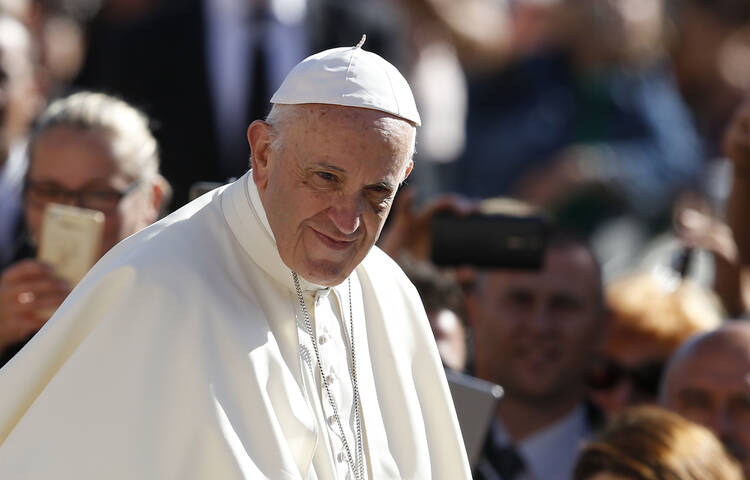Celebrating the feast of St. Matthew, the anniversary of the day when as a 17-year-old he said he was overwhelmed by God's mercy, Pope Francis said it was interesting how many Catholics today seem to be scandalized when God shows mercy to someone.
In his homily at Mass in the Domus Sanctae Marthae Sept. 21, Pope Francis looked in depth at the day's short Gospel story of the calling of St. Matthew.
The story, the pope said, has three parts: "the encounter, the celebration and the scandal."
Jesus sees Matthew, a tax collector -- "one of those who made the people of Israel pay taxes to give to the Romans, a traitor to his country" -- and calls him to follow. Jesus looks at him "lovingly, mercifully" and "the resistance of that man who wanted money, who was a slave to money, falls."
"That man knew he was a sinner," the pope said. "He was liked by no one and even despised." But it was "precisely that awareness of being a sinner that opened the door to Jesus' mercy. He left everything and followed."
"The first condition for being saved is knowing you are in danger," he said. "The first condition for being healed is feeling sick."
In the Gospel story, Matthew celebrates by inviting Jesus for a meal. Pope Francis said it reminded him of what Jesus said in the Gospel of St. Luke, "There will be more joy in heaven over one sinner who repents than over 99 righteous people who have no need of repentance."
But, the pope said, the Pharisees saw Jesus with Matthew and were scandalized that he would eat with tax collectors and sinners.
The Pharisees were people who continually repeated, "The law says this, doctrine says that," the pope said. "But they forgot the first commandment of love and were closed in a cage of sacrifices, (saying), 'We make our sacrifices to God, we keep the Sabbath, we do all we should and so we'll be saved.'"
But, the pope said, "God saves us, Jesus Christ saves us and these men did not understand. They felt secure; they thought salvation came from them."
In the same way today, he said, "we often hear faithful Catholics who see mercy at work and ask, 'Why?'"
There are "many, many, always, even in the church today," the pope said. "They say, 'No, no you can't, it's all clear, they are sinners, we must send them away.'"
But, Pope Francis said, Jesus himself answered them when he said, "I have come not to call the just, but sinners." So, "if you want to be called by Jesus, recognize you are a sinner."










The Pope is such a wise man! I am no Catholic (or even a Christian), but I see this man, a man of great intellect, using his intellect to advance the cause of mercy.
That man knew he was a sinner. "That man knew he was a sinner," the pope said. "He was liked by no one and even despised." But it was "precisely that awareness of being a sinner that opened the door to Jesus' mercy." Are we aware of our sin or are we too busy concentrating on the sin of the Pharisee?
No Catholic worth their salt would reject a repentant sinner, since we are all sinners. What Pope Francis is doing is receiving sinners who don't want to use the confessional and amend their sinful situation, that's a whole different ball game. Those who object to AL, for example, are not hostile to sinners seeking mercy but rather sinners seeking to remain in their sinful situation while the Church alters divine teaching to accommodate them. We have to watch Pope Francis and dissect every word he says in the light pf previous Church teaching and the divine law. Popes are only very occasionally infallible, they are not at all times impeccable. It's hard to get that across in these days of Modernist papolatry.